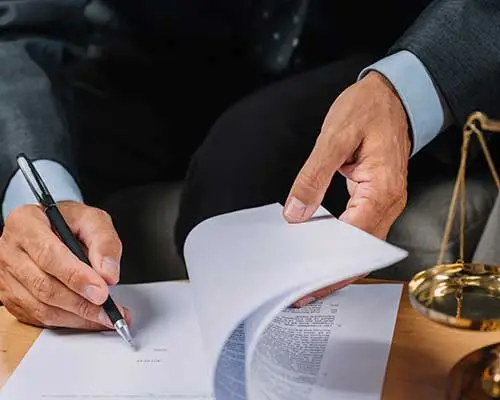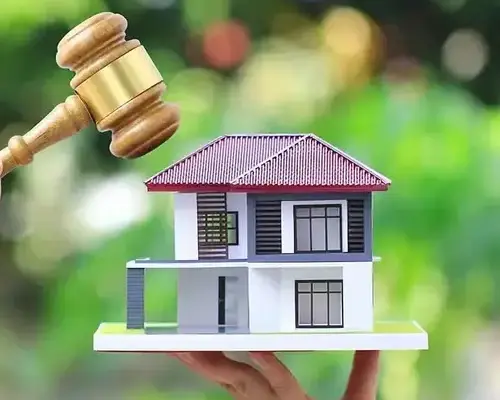How to Find the Right Attorney for Breach of Contract
A broken contract isn’t just an inconvenience; it’s a direct hit to your bottom line. It can mean lost revenue, stalled projects, and unexpected expenses that throw your entire budget into chaos. When you’re facing financial damages because someone else didn’t follow through, protecting your interests is paramount. This guide explains the different types of breaches, the kinds of damages you may be able to recover, and the steps involved in building a strong case. We’ll show you how an experienced attorney for breach of contract can help you reclaim what you’re owed and get your business back on solid financial footing.
Key Takeaways
- Understand What Constitutes a Breach: A contract is breached when one party fails to fulfill their obligations, causing you harm. To build a case in Florida, you must prove a valid contract existed, you met your end of the deal, the other party didn’t, and you suffered damages as a result.
- Don’t Wait to Seek Legal Counsel: Florida’s statutes of limitation set strict deadlines for filing a lawsuit. Hesitating can mean losing your right to sue, no matter how strong your case is. Contacting an attorney promptly protects your options and allows them to build the strongest possible case.
- Hire a Specialist, Not a Generalist: The right attorney is an investment in your outcome. Look for a lawyer with specific experience in Florida contract law and a proven track record in business litigation. Their expertise in negotiation and local court systems is crucial for an efficient and effective resolution.
What Is a Breach of Contract?
At its core, a breach of contract happens when someone breaks the rules of a legally binding agreement. Think of a contract as a set of promises two or more people or businesses make to each other. When one party fails to live up to their end of the bargain without a legitimate legal excuse, that’s a breach. These agreements are the bedrock of countless transactions, from hiring a contractor for a home renovation to signing a commercial lease for your new storefront.
In Florida, contracts govern nearly every aspect of business and real estate. Whether you’re a small business owner working with vendors or a homebuyer signing closing documents, you rely on the other party to follow through. But when they don’t, it can throw your plans into disarray and cost you money. Not all broken promises are created equal in the eyes of the law, however. The severity of the breach and its impact on the overall agreement determine the available legal remedies. Understanding the basics of what constitutes a breach is the first step in knowing how to protect your interests when an agreement goes south. An experienced business litigation attorney can help you understand your rights and options.
The Different Types of Contract Breaches
When a contract is broken, the law categorizes the failure based on its severity. The two main types are material and minor breaches.
A material breach is a significant failure that strikes at the very heart of the agreement. It’s so substantial that it defeats the main purpose of the contract. For example, if you hire a company to build a house and the foundation is structurally unsafe, that’s a material breach. The core promise of a safe, livable home wasn’t delivered. In this situation, the wronged party is typically excused from their own obligations (like making final payments) and can sue for damages.
A minor breach, on the other hand, is a less serious violation. The main purpose of the contract is still fulfilled, but some smaller detail is off. Imagine you hired a painter to paint your office beige, but they used a slightly different shade. You still have a painted office, so the core purpose was met. While you can’t cancel the whole contract, you can sue for any damages the minor error caused.
Real-World Examples of Contract Breaches
Contract breaches happen every day in all sorts of situations. In the business world, a common example is a supplier failing to deliver materials by an agreed-upon date, causing a manufacturer to halt production and miss its own deadlines. In real estate, a breach could occur if a seller accepts a buyer’s offer but then refuses to move out by the closing date specified in the purchase agreement.
The consequences can ripple outward, leading to what are known as consequential damages. For instance, if a restaurant hires a contractor to build an outdoor patio to attract more customers and the contractor fails to complete the job, the restaurant loses out on the extra revenue it would have earned. According to the NYC Bar, those lost profits could be considered damages caused by the breach. These examples show why it’s so important for all parties involved in a real estate transaction to honor their commitments.
What Legally Constitutes a Breach?
Proving that a contract was breached involves more than just showing that someone didn’t keep their word. To build a successful legal claim in Florida, you generally need to demonstrate four key elements. Think of it as a checklist for your case:
- A valid contract existed. You must first prove that there was a legitimate and enforceable agreement in place.
- You fulfilled your obligations. You have to show that you did everything you were supposed to do under the contract, or that you had a valid legal reason for not doing so.
- The other party failed to perform. This is the core of the issue—you must clearly show how the other party did not hold up their end of the deal.
- You suffered damages. You need to prove that you lost something, usually money, as a direct result of the other party’s failure.
Meeting these four points is essential to proving a breach of contract and seeking a legal remedy.
Common Myths About Enforcing a Contract
Many people have misconceptions about contracts that can prevent them from seeking help when they need it. One of the most common myths is that only formal, written documents are legally enforceable. While a written contract is always best, oral agreements can be binding in many situations under Florida law. The main challenge with verbal contracts is proving their terms, but they can absolutely be upheld in court.
Another misconception is that hiring a lawyer will only make a dispute more complicated and expensive. In reality, trying to handle a contract issue on your own can lead to bigger problems and greater financial loss. An experienced attorney clarifies your rights, handles the complex legal procedures, and develops a strategy to resolve the issue efficiently. Instead of complicating things, they bring order to a chaotic situation and work to protect your interests.
When Should You Call a Contract Attorney?
Knowing when to handle a dispute yourself and when to call for professional help can be tricky. While a minor disagreement might be resolved with a simple conversation, some situations carry significant financial and legal risks. If you’re on the fence, remember that getting legal advice early can prevent a small problem from turning into a costly legal battle. An attorney can assess your situation, explain your options, and help you create a strategy to protect your interests. Waiting too long can limit your options and weaken your position, so it’s always better to be proactive.
The moment a contract dispute feels overwhelming or the stakes are high, it’s time to consider legal counsel. A good lawyer doesn’t just represent you in court; they act as your advocate and guide, helping you make informed decisions every step of the way. They can clarify your rights and obligations under the contract and Florida law, giving you the confidence to move forward.
Key Signs You Need Legal Help
It can be tough to know when a contract issue has crossed the line from a simple disagreement to a legal problem. One of the clearest signs is when the other party refuses to acknowledge their breach or won’t communicate in good faith. If they’ve stopped responding or are denying any wrongdoing, you’ll likely need a lawyer to build a strong case and formally demonstrate the breach. Another red flag is when the contract involves a significant amount of money, complex terms, or long-term business implications. Don’t risk your financial future by trying to interpret dense legal language on your own. Finally, if the other party has already hired an attorney, you should do the same immediately to level the playing field.
The Advantages of Hiring a Professional
Bringing in an attorney doesn’t automatically mean you’re headed to court. In fact, one of the biggest advantages is having an expert negotiator on your side. A skilled attorney who understands Florida contract law can often resolve disputes through strategic negotiation or mediation, helping you avoid the time and expense of litigation. They can draft formal demand letters, communicate with the other party’s counsel, and work toward a settlement that protects your interests. This approach often leads to a faster and more cost-effective resolution, allowing you to get back to focusing on your business or personal life without the stress of a looming court date.
The Risks of Going It Alone
Trying to manage a contract dispute by yourself can be incredibly risky. Without a deep understanding of legal procedures and Florida statutes, you could easily miss a critical deadline or misinterpret a key clause in your contract, which could damage your case permanently. For example, breaches of confidentiality or non-compete clauses present unique challenges that often require swift and specific legal action. If you handle it incorrectly, you could unintentionally waive your rights or even open yourself up to a countersuit. An experienced attorney knows how to preserve evidence, file the correct motions, and build a case that stands up to legal scrutiny, protecting you from costly mistakes.
Why You Can’t Afford to Wait: Statutes of Limitation
In the legal world, timing is everything. A “statute of limitations” is a strict deadline imposed by law for filing a lawsuit. If you miss this deadline, you lose your right to sue, no matter how strong your case is. In Florida, you generally have five years to sue for a breach of a written contract and four years for an oral one. While that might sound like a lot of time, building a solid case involves gathering evidence, interviewing witnesses, and drafting legal documents, all of which takes time. Waiting until the last minute puts you at a serious disadvantage. Contacting an attorney promptly ensures you meet all legal deadlines and gives them the time needed to prepare a thorough case.
Oral vs. Written Contracts: Do Both Hold Up?
Many people believe that if an agreement wasn’t put in writing and signed, it isn’t legally enforceable. While a written contract is always best, oral agreements can absolutely be binding in Florida. The challenge, however, is proving that a contract existed and what its specific terms were. Without a written document, disputes often become a “he said, she said” situation, making it much harder to prove your case in court. If you find yourself in a dispute over a verbal agreement, an attorney can help you gather evidence—like emails, text messages, witness testimony, or records of performance—to support your claim and demonstrate that a legally binding agreement was in place.
How to Choose the Right Contract Attorney
Finding the right attorney for a breach of contract case feels like a huge task, but it doesn’t have to be overwhelming. Think of it less like a search and more like an interview process. You’re not just looking for someone with a law degree; you’re looking for a strategic partner who understands your situation and has the specific skills to help you reach the best possible outcome. The right legal professional will do more than just file paperwork—they will listen, strategize, and advocate for you every step of the way.
Your choice of attorney can significantly influence the direction of your case. You need someone who not only knows the law inside and out but also communicates clearly and makes you feel confident in their approach. This means looking beyond a firm’s homepage and digging into their actual experience, their familiarity with local courts, and their history of success with cases like yours. Taking the time to find the right legal team is one of the most important investments you can make in your case. It sets the foundation for a strong strategy and gives you the support you need to handle the challenges ahead.
Look for Relevant Experience and Qualifications
When you’re dealing with a contract dispute, you don’t want a generalist. You need a specialist. Contract law is a complex field with its own set of rules and precedents. Look for an attorney whose practice focuses on business litigation and who has a successful history of handling breach of contract cases. An experienced contract lawyer has seen a wide variety of disputes and understands the common pitfalls and effective strategies. They can anticipate the other side’s moves and build a proactive case on your behalf. Don’t hesitate to ask a potential attorney about their specific experience with cases similar to yours.
Why Florida Law Expertise Is Crucial
Contract laws can vary significantly from one state to another, and Florida has its own unique statutes and legal precedents. Hiring an attorney who has deep experience within Florida’s legal landscape is absolutely critical. A local attorney will be familiar with Florida’s court systems, judges, and the specific legal arguments that tend to succeed here. Breach of contract cases often involve complex laws that only a qualified Florida attorney can accurately interpret. This local expertise isn’t just a nice-to-have; it’s a fundamental requirement for building a strong and effective case in our state.
Prioritize Clear Communication and Strategy
The best attorney-client relationships are built on a foundation of clear and consistent communication. You should feel comfortable asking questions and confident that your attorney will explain complex legal matters in a way you can understand. Beyond that, look for a strategic thinker. A skilled attorney knows that not every dispute needs to end in a courtroom battle. They can often resolve issues through sharp negotiation or mediation, which can save you a significant amount of time, stress, and money. During your initial consultation, pay attention to how they listen and the kinds of strategies they propose.
Ask About Their Track Record
It’s perfectly acceptable—and smart—to ask an attorney about their past results. While every case is unique and past success doesn’t guarantee a future outcome, an attorney’s track record can give you valuable insight into their experience and capabilities. Ask about their history with breach of contract cases. Have they successfully represented clients in similar situations? An attorney who is confident in their abilities will be prepared to discuss their experience. This conversation isn’t about getting a guarantee; it’s about gathering the information you need to make an informed decision and feel secure in your choice.
Experience Beyond the Courtroom
A great contract attorney’s skills aren’t limited to litigation. In fact, some of the most valuable work happens outside the courtroom. Look for a lawyer with a diverse background that includes negotiation, mediation, and dispute resolution. This kind of well-rounded experience shows they can think creatively and are focused on finding the most efficient and effective solution for you. An attorney who excels at negotiation might be able to settle your case favorably without ever stepping foot in court. When you schedule a consultation, ask about their approach to resolving disputes both in and out of the courtroom.
What Are the Costs of Hiring an Attorney?
Let’s be honest, when you’re facing a contract dispute, one of the first questions on your mind is, “How much is this going to cost?” It’s a completely valid concern. Understanding the potential expenses upfront helps you plan and make informed decisions. The cost of hiring an attorney isn’t a one-size-fits-all number; it depends on the complexity of your case and the fee structure of the law firm.
Think of legal fees not as a simple price tag, but as an investment in protecting your rights and your business. A skilled attorney can often save you money in the long run by resolving the issue efficiently. Here’s a breakdown of how legal fees work and what you can expect.
How Attorneys Structure Their Fees
When you start talking to attorneys, you’ll find they structure their fees in a few common ways. The most frequent for breach of contract cases is the hourly rate, where you pay for the time the attorney spends on your case. Another option is a flat fee, which is a single, predetermined price for a specific service, like drafting a legal document. For some cases, attorneys work on a contingency basis, meaning they only get paid if you win, but this is less common for contract disputes. It’s helpful to know that hourly rates for contract attorneys are often more affordable than those at larger corporate law firms.
What Influences the Final Cost?
The total cost of your case will depend on several key factors. A straightforward dispute over an unpaid invoice will naturally cost less than a complex case involving a multi-year service agreement. The final bill is influenced by the amount of time required for tasks like reviewing documents, legal research, and communicating with the other party. Other elements that contribute to the total cost of a lawsuit include court fees, the expense of gathering evidence (discovery), and potentially hiring expert witnesses to testify on your behalf. A clear, well-documented case can often be resolved more quickly and cost-effectively.
Don’t Forget These Additional Costs
Beyond the attorney’s fees, there are other expenses associated with a breach of contract case. These are often called “litigation costs” and can add up. For example, there are court filing fees just to initiate a lawsuit, which can be several hundred dollars. You might also encounter fees for serving legal papers to the other party, paying for court reporters for depositions, or costs for mediation services. While these expenses can range from a few thousand to tens of thousands of dollars, your attorney should give you a clear picture of these potential costs from the start.
Is Hiring an Attorney a Good Investment?
Absolutely. While it might seem counterintuitive to spend money when you’re trying to recover it, hiring an experienced attorney is one of the smartest investments you can make. A skilled lawyer who understands Florida business and real estate law can often resolve disputes through negotiation or mediation, helping you avoid the time and expense of a full-blown trial. They protect your interests, ensure your arguments are legally sound, and work to achieve the best possible outcome, whether that’s recovering damages or enforcing the terms of the contract. The cost of good legal advice is almost always less than the cost of a poorly handled dispute.
The Financial Risks of Waiting to Act
Hesitating to contact an attorney can be a costly mistake. As time passes, evidence can be lost, witnesses’ memories can fade, and you risk missing critical deadlines like the statute of limitations. If the other party is refusing to acknowledge their breach, you’ll need a lawyer to step in, build a strong case, and formally demand action. Delaying not only weakens your legal position but can also allow the financial damage to grow. Taking prompt action shows you are serious about enforcing your rights and is the first step toward a resolution. If you believe your contract has been breached, it’s best to contact an attorney right away.
Your Step-by-Step Guide to Hiring an Attorney
Finding the right legal partner can feel like a huge task, especially when you’re already dealing with the stress of a broken contract. But breaking it down into manageable steps makes the process much clearer. Think of this as your action plan for finding an attorney who not only understands your situation but has the right skills to handle it. By being methodical and prepared, you can confidently choose a lawyer who will be a true advocate for you and your business. This guide will walk you through exactly what you need to do, from your initial search to knowing which red flags to watch out for.
Step 1: Start Your Research
Your first move is to find attorneys who live and breathe contract law. You wouldn’t see a foot doctor for a heart problem, and the same logic applies here. Look for a lawyer or firm that specializes in business litigation and has a successful history of handling breach of contract cases specifically. Start by exploring the websites of local Florida law firms. Read through their practice area pages and attorney bios. Do they clearly state their experience with contract disputes? Look for testimonials, case studies, or any information that demonstrates a strong track record. This initial research helps you create a shortlist of qualified candidates who have the specific expertise you need.
Step 2: Prepare for Your Consultations
Once you have a shortlist, it’s time to schedule consultations. To make the most of these meetings, you need to do a little prep work. Before you walk in or hop on a call, write down a clear summary of your situation. Create a timeline of key events, from when the contract was signed to when the breach occurred. Most importantly, prepare a list of your needs, expectations, and questions. This preparation ensures you don’t forget anything important and helps the attorney quickly understand the details of your case. It also shows that you’re organized and serious, setting a productive tone for the conversation.
Step 3: Ask the Right Questions
The consultation is your opportunity to interview the attorney. Don’t be shy about asking direct questions to see if they’re the right fit. Start with the basics: “How long have you been practicing contract law?” and “What percentage of your practice is dedicated to breach of contract cases?” Then, get more specific. Ask about their experience with cases similar to yours, their typical approach to handling disputes, and their communication style. You want to understand their strategy—do they prefer negotiation, or are they prepared for litigation? The answers you get will help you gauge their capability and determine if their working style aligns with your own.
Step 4: Gather Your Documents
Before you meet with an attorney, pull together every piece of paper and digital file related to the contract. This includes the original signed agreement, any amendments or addendums, and all correspondence like emails, text messages, and letters. Also, gather any invoices, payment records, or other financial documents that show performance or lack thereof. Having these documents organized and ready allows an attorney to give you a much more accurate assessment of your case. If the other party is denying the breach, this documentation is the foundation your lawyer will use to build a strong case and prove what happened.
Know the Red Flags to Avoid
As you meet with potential attorneys, keep an eye out for a few warning signs. Be cautious of any lawyer who guarantees a specific outcome. The legal system has too many variables for anyone to make that kind of promise. Another red flag is a lack of specific experience in breach of contract cases—you need a specialist, not a generalist. Also, pay attention to their communication. If they are difficult to get ahold of or unclear in their explanations, it’s a sign of what’s to come. Finally, don’t fall for the misconception that only formal, written contracts are enforceable. An experienced attorney will know that oral and other informal agreements can often be upheld in Florida courts.
What to Expect After You Hire Your Attorney
Once you’ve signed the engagement letter, you’re officially a team. Your attorney is now your advocate, and the focus shifts from finding representation to building a strategy. This phase is all about collaboration. Your attorney brings the legal expertise, but you bring the essential facts and documents of your case. The initial steps involve a deep dive into the specifics of your situation, from reviewing the contract line by line to understanding the full impact of the breach. Open communication is key during this time. Your lawyer will outline the next steps, explain the legal processes involved, and start crafting a plan tailored to your goals.
Building a Strong Case Together
The first thing your attorney will do is get to know your case inside and out. This means thoroughly examining your contract, pinpointing the exact nature of the breach, and identifying the damages you’ve suffered. You’ll work closely with them to create a clear narrative of what happened. This isn’t just about handing over a stack of papers; it’s a partnership. Your insights and recollection of events are crucial pieces of the puzzle. By combining your firsthand knowledge with their understanding of Florida business law, you’ll build a solid foundation for your case and define what a successful resolution looks like for you.
Gathering the Right Evidence
With a clear strategy in place, the next step is to gather all the evidence needed to support your claim. Your attorney will guide you on what’s important, which can include everything from emails and text messages to invoices, payment records, and witness statements. This process, often called “discovery,” is where you formally request information from the other party. If the other side refuses to acknowledge their breach, this evidence is what your lawyer will use to build a strong case and demonstrate their wrongdoing. Your role is to be organized and responsive, providing your attorney with everything they need to prove your side of the story.
Negotiation vs. Litigation: Choosing Your Strategy
Not every contract dispute ends up in a courtroom. A skilled attorney can often resolve issues through direct negotiation or a more formal process like mediation, helping you avoid the time and expense of litigation. Your lawyer will assess the strengths and weaknesses of your case and advise you on the best path forward. They might start by sending a demand letter to the other party to open a dialogue. If negotiation doesn’t work, they’ll be prepared to file a lawsuit. The final decision is always yours, but your attorney’s experience across different practice areas will help you make an informed choice about the most effective strategy.
Setting Realistic Timelines
It’s natural to want a quick resolution, but the legal system has its own pace. Your attorney will give you a general idea of the timeline, but it’s important to remain flexible. The duration of your case can depend on many factors, including the complexity of the contract, the other party’s willingness to cooperate, and the court’s schedule. Some issues require prompt legal action, while others may involve a longer strategic process. Your attorney will keep you updated on progress and any new developments, ensuring you always know where things stand. The goal is to manage the case efficiently without rushing and compromising the quality of your outcome.
What Are the Possible Outcomes?
A breach of contract case can be resolved in several ways. The most common outcome is a monetary award, where the court orders the breaching party to pay you for the financial losses you incurred. This is known as compensatory damages. In some rare cases, a court might order “specific performance,” which compels the other party to fulfill their original contractual obligations. Another possibility is a settlement, where both sides agree to a resolution outside of court. The best attorneys will help you understand the potential outcomes from the very beginning, working to achieve the one that best aligns with your goals.
Related Articles
- Contract Disputes – Legal Counsel P.A.
- Palm Harbor Florida Business Lawyers – Legal Counsel P.A.
- Clearwater Beach Florida Business Lawyers – Legal Counsel P.A.
- Johns Pass Florida Business Lawyers – Legal Counsel P.A.
- Belleair Shores Florida Business Lawyers – Legal Counsel P.A.
Frequently Asked Questions
What if the breach seems small? Is it still worth taking legal action? Even a minor breach can have a real financial impact. For example, if a supplier delivers materials in the wrong color, it might seem small, but it could force you to delay a project or spend money on a replacement. The key is to assess the actual damages you’ve suffered. An attorney can help you weigh the cost of the breach against the potential cost of legal action to determine if pursuing the matter makes financial sense for you.
Does a contract have to be written to be legally binding in Florida? No, it doesn’t. While a written agreement is always the clearest and easiest to prove, verbal contracts can be just as enforceable under Florida law for many types of agreements. The main challenge with an oral contract is providing evidence of its terms. Things like emails, text messages, payment history, and witness testimony can all be used to support your claim that a valid agreement existed and was broken.
What kind of compensation can I get if I win my case? Typically, the goal is to receive “compensatory damages,” which is a monetary award designed to put you in the financial position you would have been in if the contract had been fulfilled. This can cover direct losses, like the cost of hiring someone else to finish a job, as well as consequential damages, such as lost profits that occurred as a direct result of the breach.
How long do I have to sue for a breach of contract in Florida? Florida law sets strict deadlines, known as statutes of limitation. Generally, you have five years to file a lawsuit for a breach of a written contract and four years for a breach of an oral contract. This clock usually starts ticking from the date the breach occurred. Because building a strong case takes time, it’s critical to act quickly to ensure you don’t lose your right to seek a legal remedy.
What’s the first thing I should do if I suspect a breach? Before you do anything else, gather all your documentation. Pull together the contract itself, along with any related emails, invoices, or other correspondence. Having these documents organized will be incredibly helpful when you speak with an attorney. Avoid getting into a heated back-and-forth with the other party. Instead, focus on collecting the facts so you can present a clear picture of the situation to a legal professional.

















